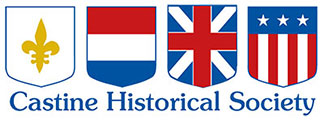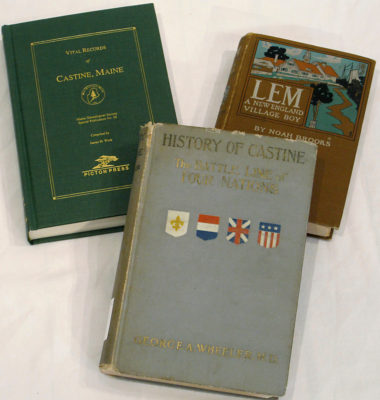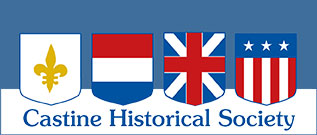Collections Overview
History of Collecting
The Castine Historical Society was organized as a non-profit corporation in 1966, and, in accordance with their stated purpose, members began collecting historical information and accepting objects on behalf of the Society. The collections—including photographs, documents, artifacts, maps, essays, research notes, books, and paintings—were kept in members’ homes and in Emerson Hall. From the beginning, the collections were in frequent use for displays, research, programs, educational projects, and publications.
After the Society moved into its headquarters at the Abbott School on the Castine Common in 1996, the volunteer Collections Committee received training in archival methods and began a rigorous effort to document donations and loans. In 2008, the Society hired a professional curator to manage the collections, assist researchers, and support volunteers working on exhibits and programs. In 2015, the Grindle House restoration and archival storage construction was complete, ready to securely store the collections and have plenty of room to accept donations documenting every aspect of Castine area history right up to the present day.
We’re committed to the long-term preservation of historical materials and to making the collections available for research as well as to support projects centered on community growth. Please feel free to contact us with any questions you might have.
What We Have
CHS collections include numerous resources on Fort Pentagoet, early American settlement, the Penobscot Expedition of 1779, the War of 1812, Castine as a fishing port, town records, and genealogical resources. Resources include books and other printed materials, photographs, paintings, physical artifacts, and copies of archival documents. To search these collections yourself, visit our online catalog. For a general summary of our holdings, see below:
Photographs
In addition to picture postcards, CHS has acquired other photographic records ranging from a daguerreotype of Noah Brooks to a digital image of the town band. Included in this collection is approximately 100 photographs of Castine streets and landmarks by Boston photographer A.H. Folsom in the late 19th and early 20th century. Images of individuals are indexed and location-based images are organized by street name.
Letters and Diaries
The Historical Society has a series of primary source letters, diaries, and business records documenting Castine’s history as a commercial port and thriving coastal community. Most of these date from the mid-nineteenth through the early twentieth century. These records focus primarily on business, but there are many items of personal correspondence that will also be of interest to historians and genealogists. These records are cataloged and key word searchable within an in-house database.
Maps
CHS has recently cataloged the majority of its maps collection, which depict various areas of local geography and include material from the 18th to 21st century, with the bulk of holdings dating from the 19th century.
Town Records
The Historical Society holds a large number of municipal records for the town, from various sources such as private donations and accruals from Emerson Town Hall for whom CHS acts as an official alternative repository. The dates of these records range from the 18th to 20th century and they include tax record books, financial records, legal material and deeds, correspondence, and reports.
Oral Histories
A number of oral history interviews with town residents and historians have been conducted by dedicated volunteers over past decades. These have been made accessible online.
Printed Books
CHS has approximately 600 books in the research library on the history of Castine, the surrounding area, and works authored by local writers. In addition, the Historical Society has approximately 200 volumes of antique and rare books on a variety of subjects ranging from regional history, children’s books, and general fiction. These have been cataloged in the in-house database.
Physical Artifacts
CHS has a multitude of artifacts relating to Castine history. These include musket balls, buttons, and other artifacts relating to the 1779 Penobscot Expedition and the British occupation in 1814. Other physical artifacts cover the late seventeenth century habitation of the Baron de Castin and portions of Castine’s more recent past. Object collections are currently in the process of being cataloged.
Paintings
The Historical Society has collected approximately 20 landscape paintings by Castine author, gentleman artist and Abraham Lincoln confidant Noah Brooks, as well as more recently acquired 20th and 21st century works by local artists. Please note that the majority of these collections are not on permanent public display, but reference photos can be provided on request.
Clark Fitz-Gerald Archives
CHS stewards a sizeable collection of diaries, letters, and 2-dimensional art created by Castine-based artist and sculptor Clark Fitz-Gerald (1917-2004). This includes the entirety of Clark’s sketchbooks which he used throughout his life, as well as loose drawings, sketches, and caricatures. Please note that access to this collection is currently at the discretion of the donors.
Yearbooks and School Records
CHS has records for Castine elementary and high schools, and the Eastern State Normal School. Resources include yearbooks, writing contest entries, and yearbook project for the Castine Schools. Normal School records include yearbooks, viewbooks, and course catalogs from as early as 1869. CHS also holds a few resources on the history of the Maine Maritime Academy.
Newspapers
The Historical Society has a variety of local newspapers donated by local residents, primarily from the late nineteenth century. Local volumes include The Castine Gazette (1882-85), The Castine Visitor (1883-85), and The Eagle (1809-11). Regional volumes include The Columbian (1806), and The Christian Register (1832-38).
Postcards
The Castine Historical Society holds approximately 1800 postcards primarily displaying landscape images of Castine and other local areas, ships, and places of interest. The bulk of the collection is focused on the early 1900s (1900-1920s), and includes blank cards and post marked cards with messages. Postcards are organized by street address.
Genealogy Resources
The Historical Society has created vertical files for research on local area families. Many of these resources have been donated by family members to the Historical Society, and include letters, diaries, pictures, family trees, census records, vital records, and cemetery lists for Castine and other area towns. There are also several binders compiled by family genealogists for some of the most major Castine families.
Penobscot Expedition Research Files
CHS members have conducted extensive research in libraries and archives in the United States, Canada, and Great Britain in support of our permanent exhibit on the Penobscot Expedition of 1779. Holdings include copies of British, American, and Massachusetts state records on the organization, conduct, and aftermath of the campaign. The Massachusetts records extend to 1820. Files are organized by surname of participant or resident, vessel name, and topic.
“Castine in the War of 1812” Research Files
CHS members have conducted extensive research in the British, American, and Canadian national archives as well as the Massachusetts and Maine state archives on Castine’s trading economy, smuggling, and the War of 1812. Our holdings include copies of primary source British and American newspapers, the United States Treasury, military records, maps, and copies of subsequent secondary source research on this time period.
Reference Files
In addition to formal collection items, CHS has extensive reference material held in vertical files. These records are primarily photocopies of relevant materials found in books, genealogical resources, newspapers, and online, organized by family name, streets, and subjects relevant to the history of the town. The reference files are an excellent first port of call for anyone beginning to research a person or place, or for those casually interested in learning more about a particular facet of the town’s history.


